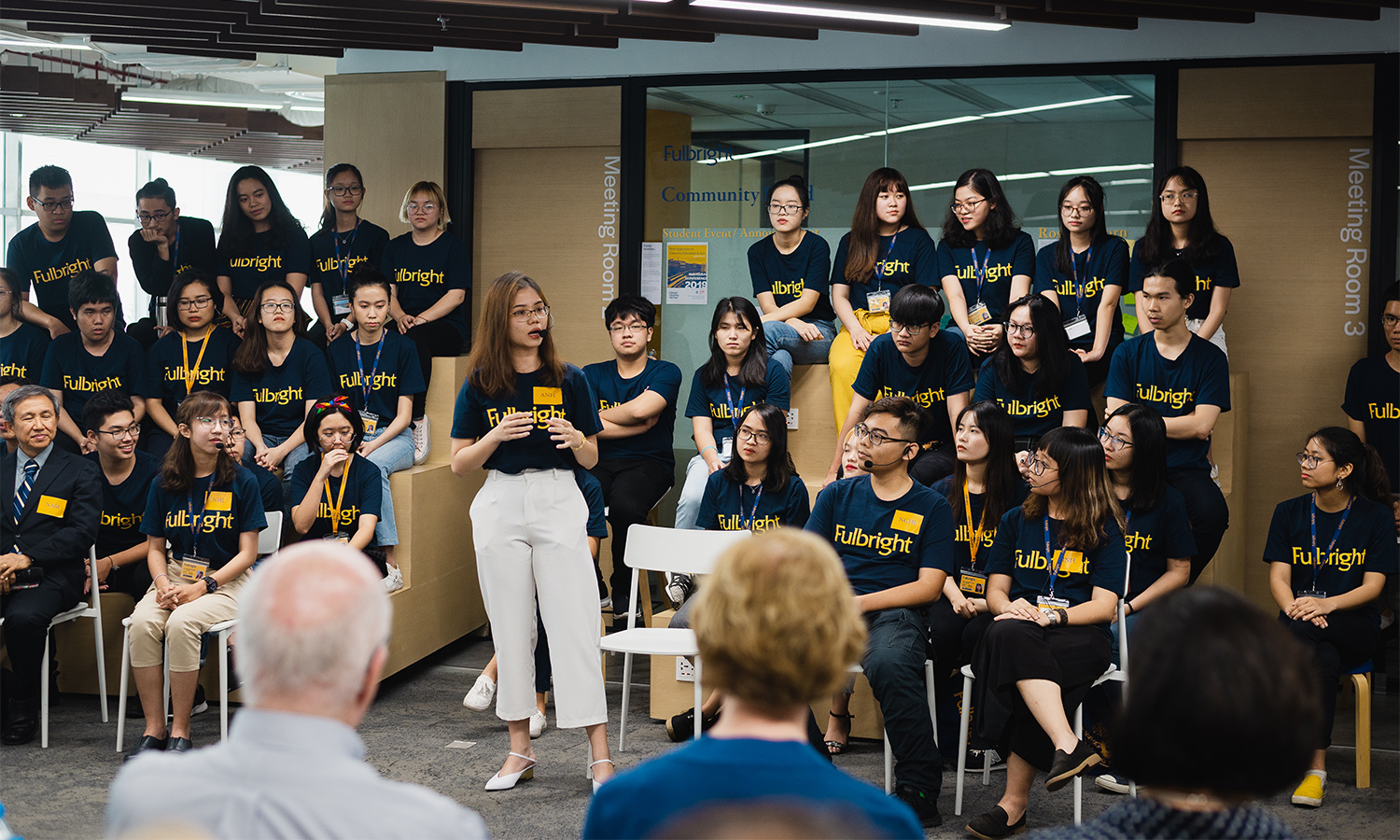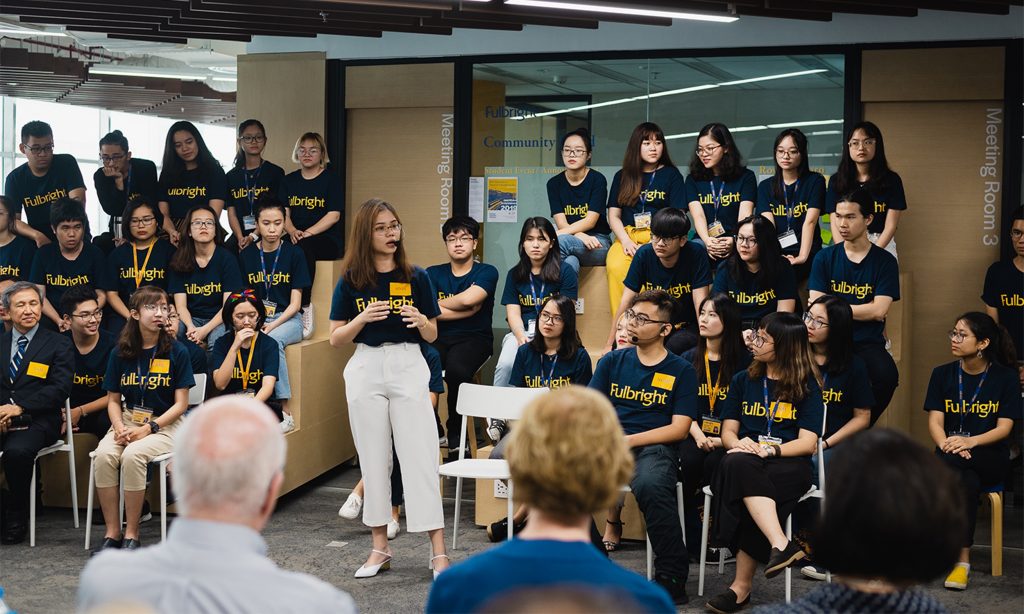
Fulbright team including Phan Thuc Anh, Phan Hoang Dzung, and Nguyen Nhu Phuong Anh participated in the 10th United Asian Debating Championship (UADC 10), the first international debate championship organized in Vietnam. The team was ranked first among the Vietnamese debate team and only stopped short at the Quarter Finals.
Following is the reflection covering Thuc Anh’s thoughts about this competition.
ABOUT DEBATE ITSELF
Debate as an art:
I had a huge fear and hatred for debate. I must now concede that debating is, in a way, an art of persuasion. In order to make the audiences buy into the team’s arguments, debaters are required to go through two complicated processes of motion preparation and speech delivery.
First, debaters have to use their content knowledge as well as their critical and logical thinking skills in a 30-minute preparation phase. Within this period of time, participants must be able to identify the core problem laying within the motion and the incentive of bringing this issue to the debate table, which requires at least some basic understanding of the world’s affairs and the use of critical thinking.
Next, they need to use their logical and analytical thinking to justify their reasonings pro or against the motion. The reasonings should be coherent, evidence-based, and successfully show the connection between the claim and its impact.

Nguyen Nhu Phuong Anh, Phan Hoang Dzung.
After preparation, it’s time for the warriors to go straight to battle. It’s a complex combination of listening comprehension, critical thinking, and synthesizing, with public speaking and body language awareness. They have to digest the content of the opponents while thinking of their own rebuttal and speech arrangement.
Once a debater steps onto the podium, s/he should be in control of her speech’s content and start to apply all her body language skills such as eye-contact, gesture, tone, speaking speed, etc.
Besides their own natural instinct and talent, the debater needs a lot of discipline and practice time; which leads me to the following opinion…
Debate as a sport:
Debate is definitely a sport for me as it requires a rigorous amount of training, practice, and exceptional teamwork. Debaters must work well with their teammates, as well as with their coach.

Just like any other sport, debate also requires tons of techniques, strategies, and exposure to real experience and tournaments. Debate is about winning and losing, and treasures every nick of time.
Debaters therefore have the opportunity to enhance their skills, intelligence, acumen, determination, perseverance, and discipline. In short, debating can be as beneficial as playing any other sport.
ABOUT TEAMWORK IN DEBATE
There are debate formats that include one man on each side, however, as we chose to participate in the Asian Parliamentary Format, we had to learn how to play the game as a team of 3 members.
First of all, we needed to understand each other’s strengths and weaknesses to best arrange the positions. We tried all possible arrangements before opting for the final one. During our training, we practiced being patient with each other’s imperfections and individual learning paces.
We also learned to keep an eye on each other’s performances so that we could hold a constructive debrief at the end of the day. The constant feedback and debriefs helped us grow and significantly improve our skills.

ABOUT THE PROCESS OF GOING THROUGH FEARS
It is undeniable that I’ve had a fear of debating since I was a little child. I always had some trouble articulating my thoughts and arguing for or against opinions. I could barely argue with my elder sister and always cried in vain. I could barely give a speech without a well-prepared script. And only a year ago, debating was my answer for the “Difficulties in learning” question in my Fulbright application.
Yet here I am, finishing my very first (international) debating tournament. What brought me here? I realized I was afraid of debating because no one was there to help when I was a child struggling with my words.
I received no help and knew of no ways to get rid of my fear. I didn’t know how to fix this problem. I just tried running away from it and let fear conquer me. Fear, day by day, became hatred. I hated debating and anyone who liked to debate. I saw debating as non-sense and as an extreme, unnecessary form of arguing.
Time passed and I gradually realized that I hated debate because I couldn’t do it, and in order to do things I once could not, I had to get over my old attitudes. There came a moment when my inner voice told myself, “Face them, face them all, get through your fear, do things you hate the most, do things you fear the most. And you’d better be good at debating”. So, I just went for it.

I’m not proud to admit that I was deeply stressed during the last two weeks in Hanoi. For the very first time, I experienced sleeplessness, anxiety, fear, loss of appetite, frustration, and irritation. Training time was bearable but every time we got to a debate, those irritating and frustrating feelings emerged.
But I persisted and attended different debates with my team, telling myself, “you can do it, you have to do it, you should do it”. Every second before a debate started, I felt stressed: my head hurt, my body shook, and my heart jumped out of my chest.
Every time I entered a debate, I felt my fear ripping away parts of me. I tried different ways to deal with this unwanted phenomenon: I sang, I jumped, I listened to music. I told myself, “just once more”.
One thing I’m proud of is my ability to block out all kinds of emotions the moment I step into the debate. It’s how I can concentrate on my work and do my best. After each debate, I experience the satisfying moment when I look at my inner child and say, “aha, you just did it again”.
The more I debate, the more I understand the game and the more I have control over it. However, the stress still doesn’t vanish, returning to haunt me before each round. I later compared these moments to “jumping out of a plane and diving into the sky nine times and over”.
After the tournament, I fully recovered and got rid of my stress through meditation and self-reflection. But I’m now fully aware that the dangers of stress are real. Now, more than ever, I feel concerned for people who don’t have support and sufficient care to deal with their stress. To focus on the UADC reflection, I will discuss this issue in depth at a later time.
Stress might have killed parts of my inner child, but it’s also given me the foundation to be reborn and to be freed from anxiety. The woman who masters debating has not yet arrived, but that inner child who once cried in vain has already changed.
She stands still facing her own monster knowing that it’s no longer a monster but a new part of her life. She knows she can do it, she has enough support and guidance, and the only question left is how to improve her own capacity.
Dzung and Phuong Anh once asked me whether debate is for everyone and I said, “Yes. You can have people do things they used to hate and transform. But just make sure that they have enough stamina, resilience, and means to get through it.”
ABOUT THE FUTURE AND THE NEXT STEPS
During the training, several questions remained with me: “Why is debate culture still limited in our country? How developed do we want it to be? How can we change it?”. I am longing for more careful and detailed research on this issue. In the meantime, my thoughts are:
Debating might not always be good due to its extreme nature, however, being able to articulate your own thoughts effectively is undoubtedly important.Vietnamese students have the brightest talent and a lot of potential abilities, but the majority of them still have difficulties expressing themselves.
They cannot present what they think, cannot persuade a soul, cannot fight for their own thoughts. And so it goes. As their voices remain unheard, their talent stays silent and their potential stands still.
But the need to change is grossly unaddressed. Ho Chi Minh city, despite being one of the leading cities of the country, has only a few or no debating community. Even Ha Noi, where the debating communities have grown much stronger, still can’t offer enough official platforms with proper and standardized debating classes.
In the beginning, I aimed for the standards of other established Vietnamese teams. But soon I realized that what these teams are capable of is just one fifth of what other international teams, such as Australia National University (ANU), can do.

Their debating skills, including the fact that English is their mother language, raised the game to a whole new level. But that’s not all. ANU is not the best team in Australia, and Australia is still a small part of the world’s debating community. Where does Vietnam stand?
Nonetheless, it is unwise of me not to notice the blooming of Vietnam’s potential. Just taking Vinschool’s students as an example: their English proficiency, confidence, and bravery are absolutely impressive. Olympia and Truong Teen are other examples that illustrate the new wave of students actively involved in debate.
This wave includes a wide range of students from both private and public schools, and domestic and boarding schools. They take the train for days and nights to participate in tournaments and make debate a firm part of their lives.
One problem is that Vietnamese students who wish to debate often have to find training resources outside their official schools. What are our national schools doing?
And turning our gaze inwards, what is Fulbright doing?
One simple action that we can certainly take is to grow and improve the Fulbright Debate club, founded by Hoai Linh and chi Trang. Huyen Nguyen, our upcoming student, will also be significantly involved in strengthening the Fulbright debate environment.
The club should form at least 2 debate teams, seek out coaches, connect and collaborate with both domestic and international debate communities, and aim to attend different tournaments to build experience. The club can also offer more workshops and occasional training days for the public.
Besides Debate club’s endeavor, Fulbright should aim at embedding debate spirit into its academy. Possible options include conducting research and studies on debate education development exclusively for Vietnam, encouraging students to apply rhetoric and debating skills within classes (which we have recommended throughout the Codesign year), and organizing our own tournaments.
FINAL WORDS
As we previously mentioned, our team hopes to use our experience as a starting point and help Fulbright establish debate education. The journey of Fulbright as well as its debate community have just started, and we are looking forward to having everyone’s companionship, support, and involvement along the journey. THANK YOU.
Phan Thuc Anh







